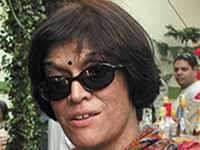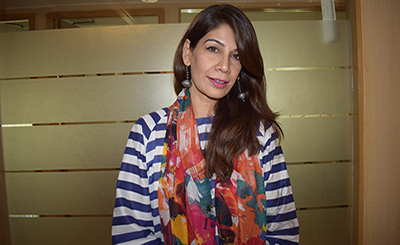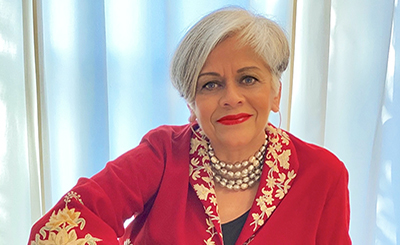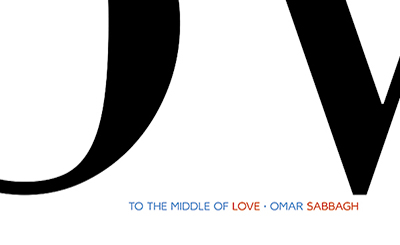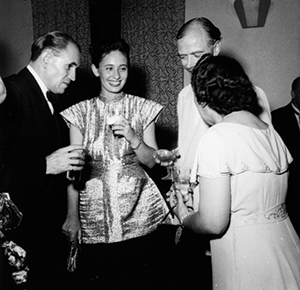
Merle Oberon in Calcutta on the occasion of the inauguration of SAS, 1949. Courtesy: Wikipedia
She was a memory of curly hair, a husky voice and the liquid flash of large dark eyes. The relatives surrounded me in a seriously hushed cluster and told me her beauty was legendary. “Ah,” they said, in awed voices, “Maya, she was so beautiful. You’ll never understand.” And they shook their heads over my failure of taste or perception or whatever they felt it was. They were right, of course, I didn’t understand, but that was neither due to my taste or eyesight. By the time I saw her she was a small awkward shape with too many chins. Perhaps the dark eyes still retained their famous sparkle but a divorce and a ruffled fledgling daughter, who showed not a trace of her charm, dragged at her skirts and blunted the magic.
What they told me about her life, when they were in the mood, was like a series of sepia pictures, someone’s brittle leather-bound album flipping past your eyes. I would sit on my great aunt’s Italian marble floor and take it in as if it was a fairytale. Elephants, maharajahs in jewelled turbans, tents and champagne breakfasts... She had all of that from her grandfather. I had a vague memory of his leathery library, and the dark, heavy pictures that hung around it. Everyone called him my Picture Grandfather to distinguish him from my other, more immediate grandfathers. He was a once upon a time figure with a title, a Sir to add to the orotund syllables of his name Raghuvendra Roychowdhury, and a place at the Viceroy’s table. Stories came back to my grandmother and aunts, dimly filtered by inept recounting, of gilt-edged banquets in Delhi and white-gloved lords and ladies. Rolls Royce Roychowdhury, they called him because he steamrollered his way through the polite society of the British Raj in a kind of triumphal swathe, leaving crushed bodies in his wake.
His money came from his aunt, the childless widow of a landlord from the border estate of Taki that has since vanished into Bangladesh. She adopted him, made him her heir and started him on the extravagant progress of his life. She found him a wife who was famed for her ugliness and her temper across three states. A wife they called Lady Kali after the Goddess of Destruction. Somehow, between them, they produced a son and a daughter. When the son was old enough to marry they chose a pretty, blushing girl with an impeccable pedigree. But though Lady Kali selected her, she was threatened by her beauty and banished her behind the veils of purdah. For their daughter, on the other hand, Lady Kali assembled an all pink trousseau to complement her fair skin, something unheard of in those days. “Bad taste,” sniffed my mother. “She was a woman who came from a very ordinary background.” The girl with the rose coloured trousseau went on to become Maya’s mother.
Maya was born on a blindingly bright summer morning, with an anxious English doctor in attendance. Her grandfather cracked some many bottles of French champagne that the air was loud with the popping of corks. She was promptly given one of those punning English-Bengali nicknames that were so popular in the 1930s: May for the month of her birth and May because it was close enough in pronunciation to “meyeh”, the Bengali for “daughter”. Her real name, Maya, was forgotten after her mother died. The girl with the rose pink saris and blouses died young, leaving her daughter to the mercy of a succession of governesses. I imagined them heavily made up and powdered into a generation of Merle Oberons, since that was as close as I could get to the real thing. Perhaps the Merle Oberons were responsible for what May became, seducing her with eyeshadow and experienced charm.
“What beauty,” asked my Aunt Rita irritably as we stared into the depths of one of her sepia portraits. “She looks quite ordinary to me.”
Heads shook all around and people launched into their, “You cannot hope to understand” explanations all over again. Aunt May belonged to the days of seven stranded pearl necklaces that reached down to the knee — “Basra pearls, every one of them, worth a Shah’s ransom.” Careless extravagant days of sooty kajol-lined eyes and slow, shrugged off stoles — even though she had caught the kajol from the Russian Ballet and not concocted the look at home over a slow burning leaf doctored with oil-like decent girls had their maids do for them. Aunt May do that? Never! The only time I ventured into a long conversation with her was when she told me about how she used to loll on a long leather sofa and listen to the Armed Forces radio instead of doing her homework, secretly so her grandfather wouldn’t hear. And then she would pick up a bottle of something called Durogloss and set her nails blazing with crimson. That was far more effective, she said, then a convent education. Though she caught herself up on a wary smile after that and advised me not to repeat it.
Page
Donate Now
More from The Byword
Comments
*Comments will be moderated



